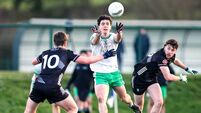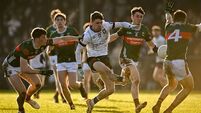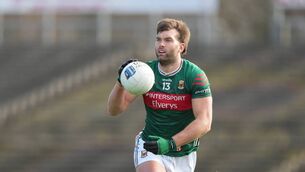Time for GAA and TG4 to get tough on language

Damien Mulligan, in his previous capacity as Belmullet manager, speaks to TG4 in advance of the 2021 Mayo SFC Final at James Stephens Park, Ballina. Picture: INPHO/Evan Logan
A recent online comment about whether a pub in London was showing a Mayo match caught my eye. The commentator wanted to know was the match being broadcast in English, leaving us in no doubt about their disdain for an Irish language commentary – going as far as stating that they never heard a word of Irish spoke in Croke Park at any match they attended. The tenet of the comment was Irish was old hat and anti-modern.
Maybe it’s the fact my grandparents spoke no English and that my mother’s first taste of the English tongue was in her early twenties in Dublin of the 1940s but my inner thick was prodded. I am aware this is the sports page but often politics and language get distilled into sport. And I believe we need to have a discussion on our first language, its place in the state, school, community and sport.
Massive money is being wasted, in my opinion, on trying to do something with the Irish language. When we read about an Coimisinéir Teanga or Oifeagach Pleanála Teanga being in place to assist the language, we know it’s in trouble. Des Bishop, in his ‘In The Name of the Fada’, opened my eyes to the obvious. A man who had no Irish went on a journey, a painful one, but mastered the tongue. He noted that we poured millions into teaching the language in schools from the age of 5 to 18 but most kids had in large numbers left school with a poor grasp of the language.
I knew this before Des stated it, but hearing it from another, the folly seemed crazy. Nothing has changed since. We put in place plans and people to implement the plans but the language battles, manfully, to try and have meaning and relevance. Now this is not linear – the fact is that the Gaeltacht is shrinking in its speaking the language. As a child in Gaoth Dobhar, the only language I heard was Irish, one hundred per cent. Not anymore. And that would be one of the strongest Gaeltachts.
On the other hand, the Irish language is flourishing in areas like Lucan, Leixlip, Ashbourne, pockets in the big city, areas like Clondalkin. Towns like Dunboyne and Maynooth have thriving Irish language events. A site called Save Mayo Gaeilge had dampening figures: no regular Irish speakers under forty, just eighty speakers left and the language ‘clinging” in villages south of Elly towards Blacksod. Again, this is not linear. Colaiste Uisce at Elly Bay is the nation’s excellent brand leader in promoting the language from teenage age up to corporate company level. Going into Colaiste Uisce, the Irish language and culture booms. But up the road the language faces challenging times. Thanks to Colaiste Uisce, the language will survive but it needs help from the areas surrounding it to progress further.
So, what’s all of that to do with football and the GAA you rightfully ask. Plenty as it turns out. TG4 was set up as a station catering for Irish speakers; we don’t lack English-speaking medium media. It produces programmes of top quality, particularly in culture, music and current affairs. However, it has excelled, in particular, in its presentation of GAA matches be it hurling, football or camogie. Club football and hurling has had its status elevated thanks to TG4’s presentations. I know, you’re waiting for my crib. It’s coming. Whilst having Irish speakers commentating and analysing, most of its interviews with managers and players are carried out in English.
It’s truly a shocking feat that a squad comprising up to thirty players, a backroom team of at least ten plus a PRO, yet TG4 cannot get a single competent Irish speaker pre or post-match. It’s not just the GAA. In rugby a few years ago we had a farcical situation during a Munster match where the sideline roving expert with passable Irish started a post-match interview with a Munster player in English. The player expressed surprise, ‘ní as gaelilge?’. Cue embarrassment and a nervous laugh from the interviewer, followed by the Munster man offering to do the interview in French then. He cut his losses and the interview went ahead in English. It was a cringe moment best viewed through the fingers.
Article 8 of our constitution puts Irish as the official language of this state. And that for the state seems to be their main contribution to the Gaelic. So it’s easy to see why the Bank of Ireland and Aer Lingus refuse to put the names of its customers into Irish. They cite technical issues with fadas and litrú. An issue that doesn’t occur in France, Spain, the Slavic countries or Turkey, with the same literation we have here. It’s why a company in West Donegal that received over €4 million in state grants could tell it’s predominantly speaking Irish-speaking workforce that English was to be the shop floor language. Once challenged the old excuse arrived: the email content to staff was lost in translation, it was for some other place. And Santa sits on your chimney.
Some years ago a referee in Galway ordered a Gaeltacht team to stop talking in Irish on the pitch. Incredible. So we have the old problem surfacing again. Thirty people speak Irish in an area, one English speaker comes in with no Irish. The dilemma? Do the thirty switch to English to accommodate the newcomer or does the newcomer try and learn Irish to integrate? Being hospitable and bilingual, the thirty do the right thing and become sociable. But are they taken for granted? Cymru S4C, the Welsh television station, carries out all its sports in that language, including players, pundits and Instagram builders. No Welsh? no interview.
Which brings a few questions. Is TG4 an Irish-speaking channel or a channel for Irish culture? Believe it or not, both can be accommodated and both through the medium of the native tongue. Likewise, the Comortas Peile na Gaeltachta. Is this tournament for clubs with Irish speakers in our gaeltachts or is it a competition for clubs sited within gaeltachts. There is a huge difference. When I attend the Oireachtas na Samhna I’m pretty certain that the entire weekend will be in Irish. Music, dancing, Sean nòs and scealiocht. As will 95% of the attendance speak Irish. I have attended many Comortas Péiles and its crucifying embarrassing listening to teams that couldn’t muster a paragraph in Irish amongst them yet feel entitled to be there.
So what do we do? In TG4’s case, all match interviews should be in Irish. Before the game starts find out from the teams who their designated gaeilgors are. If none, stick in that non-post, the Oifig na Gaeilge, and blow the cobwebs of him or her. I’ve a funny feeling that sufficient lads and lassies, when push comes to shove and a chance of national exposure may slip from their grasp, will suddenly recall a few focals from their thirteen years at school trying to master the tongue.
The Oireachtas a long time ago learned a few valuable lessons. The first was to take it out of Dublin, the second was to involve the youth who have magical music within them, marvellous energy and given the chance, no better people to mix music and language over a three-day festival just like the Fleadh. So, the Comortas Peile na Gaeltachtai should undergo a title change and become Comortas Peile na Geailge, not Gaeltacht, thus bringing in nationally, new areas that speak more Irish than the shrinking gaeltachts. It’s now recognised that the gaeltachts alone cannot save the language thus the battle has begun with the highly successful Gaelscoils nationally. And where possible, your GAA team should have a bona fide Irish speaking ethos not by dint of being located within a Gaeltacht.
The tired weekend fest of teams with lán gaeilgòrs and teams with the good fortune to be located within a so-called Gaeltacht but little Irish connection can be freed to play their own competition, allowing those who espouse the language to expose it more. I’m blown away by the ease that lads and ladies from Derry, Tyrone, Armagh, Antrim, Down and Fermanagh can converse fluently on TG4, as can Galway, Kerry, Donegal and Dublin lads. After that it gets thin. A county that claims a Gaeltacht, Mayo, is an embarrassment in the lack of Irish speakers capable of being utilised by TG4. I know, you’ll throw some name at me as the one who can speak. I’ll throw back forty at least from the above-named counties.
The Ireland I was born into is long gone, like Yeats’ poem ‘September 1913’:
But. We have our language, our national games, our voices. At a time of revolutionary change here, what was isn’t any more, areas long abandoned being replenished by others. Irish people need anchors to stabilise themselves, flag poles to fly their favours and history, music and games. Otherwise we become an island on the edge of Europe homogenised by Europe. Once we were the beacons who brought light the other way. If we lose the language, what next? The music, the poetry, the literature? It’s from the tobar of Irish that springs our music, poems and games. Let’s not mess with it. Quickly it could wind up like Manx and Cornish, curios from another age. We deserve more. We are bigger than that.




